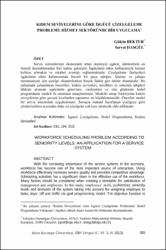Kıdem seviyelerine göre İşgücü çizelgeleme problemi: Hizmet sektöründe bir uygulama
Citation
Bektur, G , , , Hasgül, S . (2013). KIDEM SEVİYELERİNE GÖRE İŞGÜCÜ ÇİZELGELEME PROBLEMİ: HİZMET SEKTÖRÜNDE BİR UYGULAMA . Afyon Kocatepe Üniversitesi İktisadi ve İdari Bilimler Fakültesi Dergisi , 15 (2) , 385-402Abstract
Servis sistemlerinin ekonomide artan önemiyle işgücü, işletmelerin en önemli kaynaklarından biri haline gelmiştir. İşgücünün etkin kullanımıyla hizmet kalitesi artmakta ve rekabet avantajı sağlanmaktadır. Çizelgeleme faaliyetleri işgücünün etkin kullanımında önemli bir paya sahiptir. İşletme ve çalışan memnuniyeti için çizelge oluşturulurken birçok faktör göz önüne alınmalıdır. Bu çalışmada çalışanların becerileri, kıdem seviyeleri, tercihleri ve sistemin talepleri dikkate alınarak işgücünün görevlere, vardiyalara ve izin günlerine hedef programlama modeli ile atanması amaçlanmıştır. Modelin amaç fonksiyonu kıdem seviyelerine göre gevşek kısıtlardan sapmanın en küçüklenmesidir. Önerilen model bir servis sisteminde uygulanmıştır. Sonuçta manuel hazırlanan çizelgeye göre çözüm kalitesi açısından daha iyi çizelgeler çok kısa sürelerde elde edilmiştir. With the increasing importance of the service systems in the economy, workforce has become one of the most important source of enterprises. Using workforce effectively increases service quality and provides competitive advantage. Scheduling activities has a significant share in the effective use of the workforce. Many factors should be considered when creating a timetable for satisfaction of management and employees. In this study, employees’ skills, preferences, seniority levels and demands of the system taking into account for assigning employee to tasks, days- off and shifts via goal programming model. The objective function is minimizing deviations from soft constraints according seniority levels. The proposed model applied for a service system. As a result high quality solutions obtained within short times compared to manually prepared schedules.
Source
İktisadi ve İdari Bilimler Fakültesi DergisiVolume
15Issue
2Collections
- Cilt 15 : Sayı 2 [25]



















